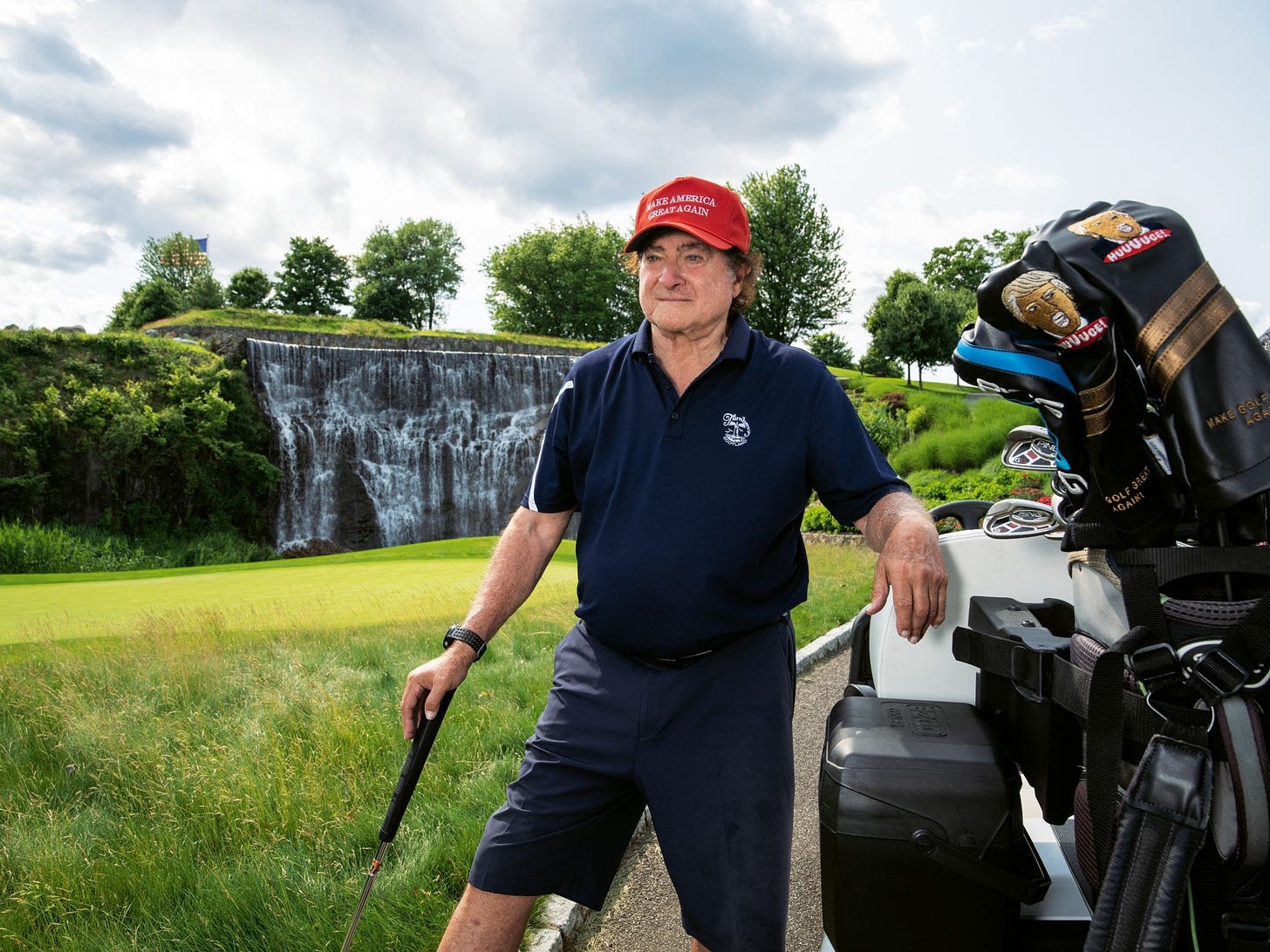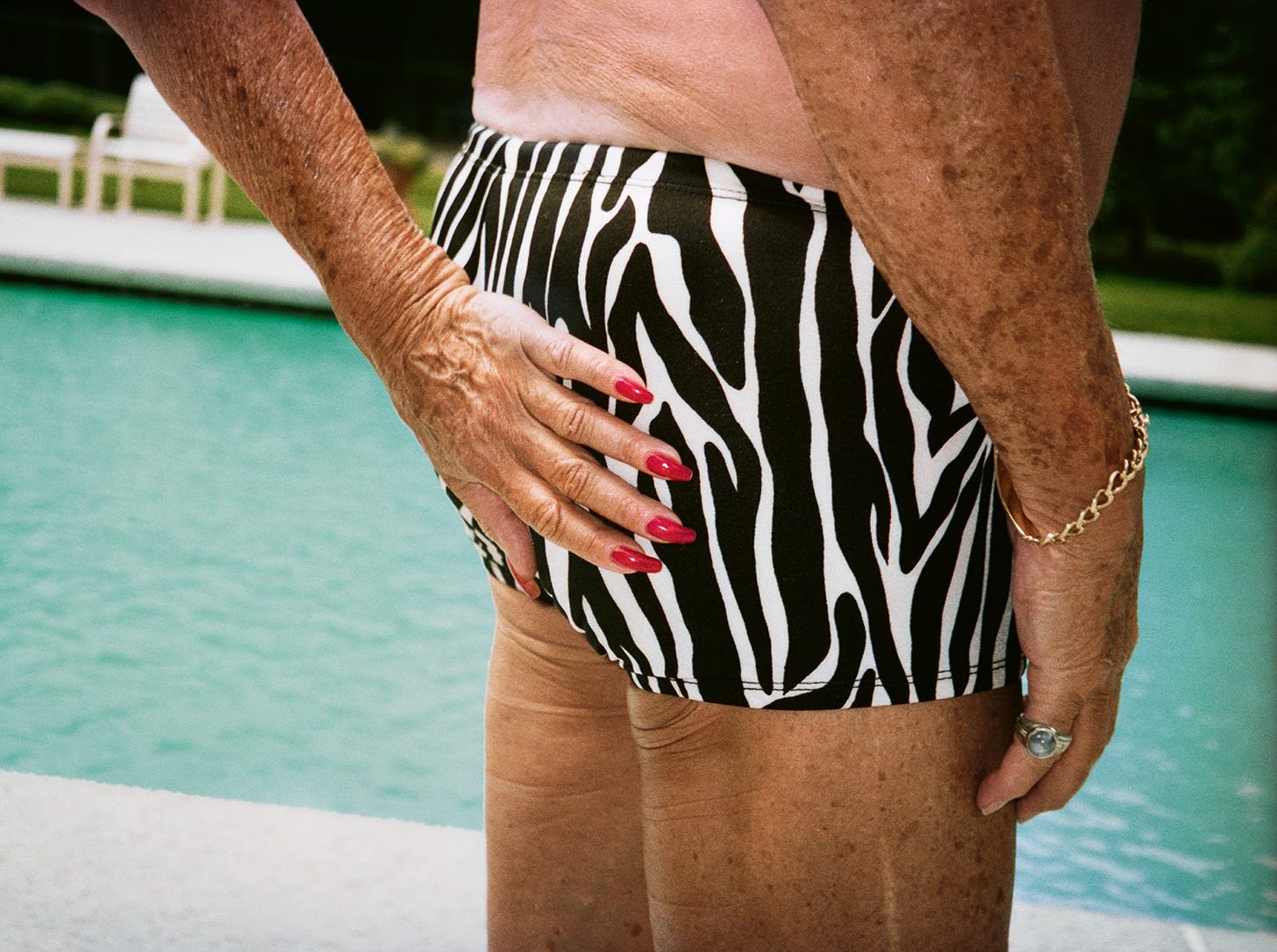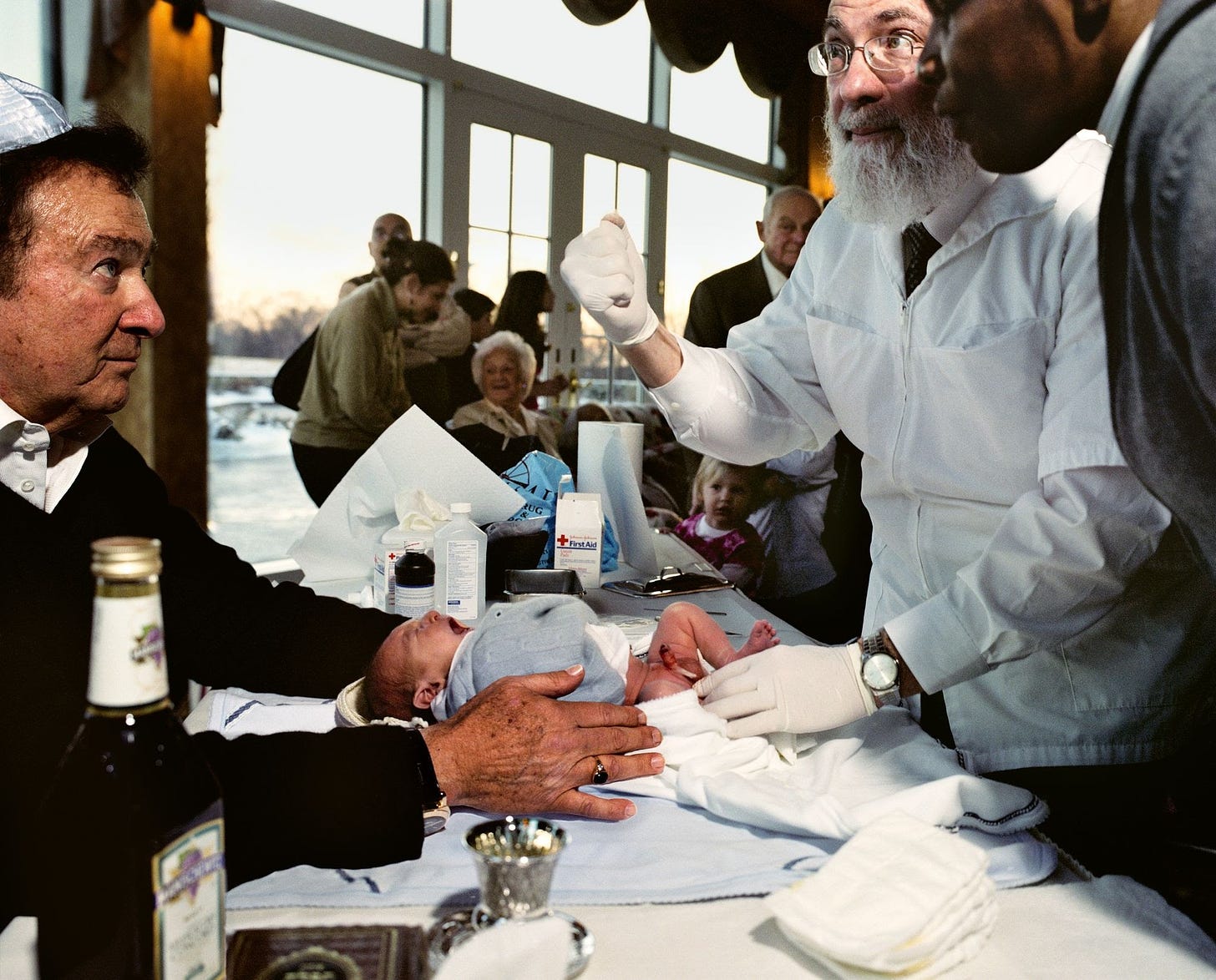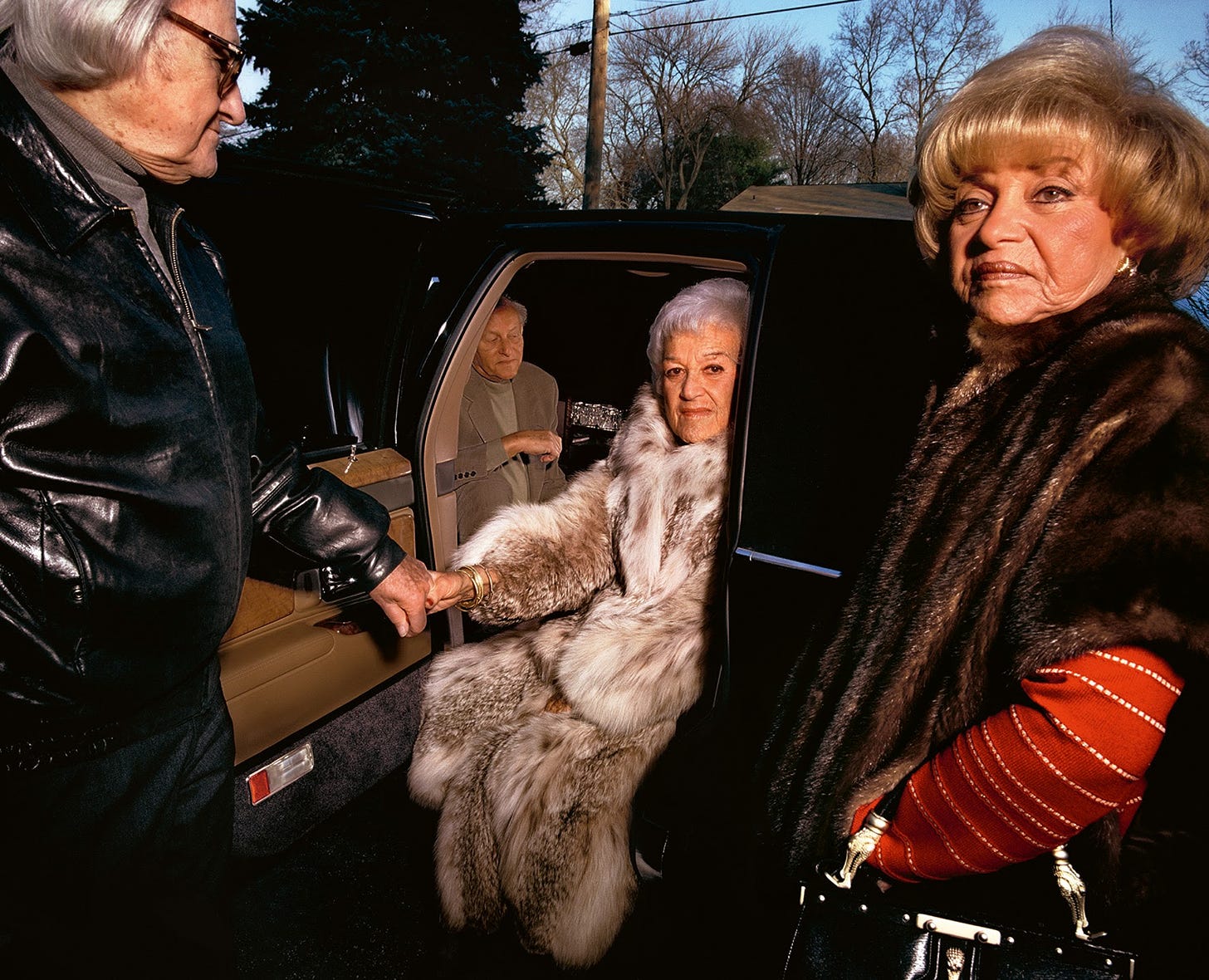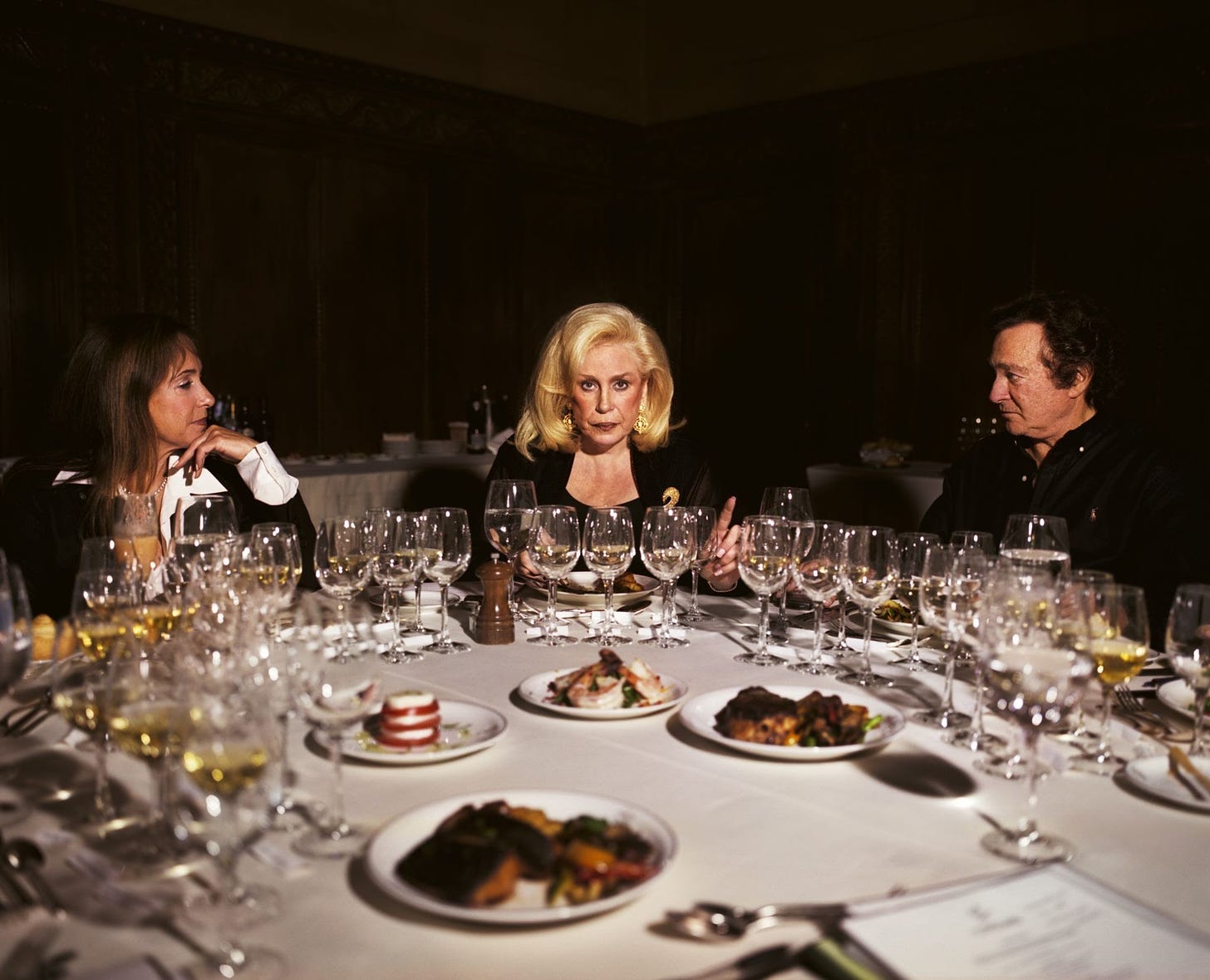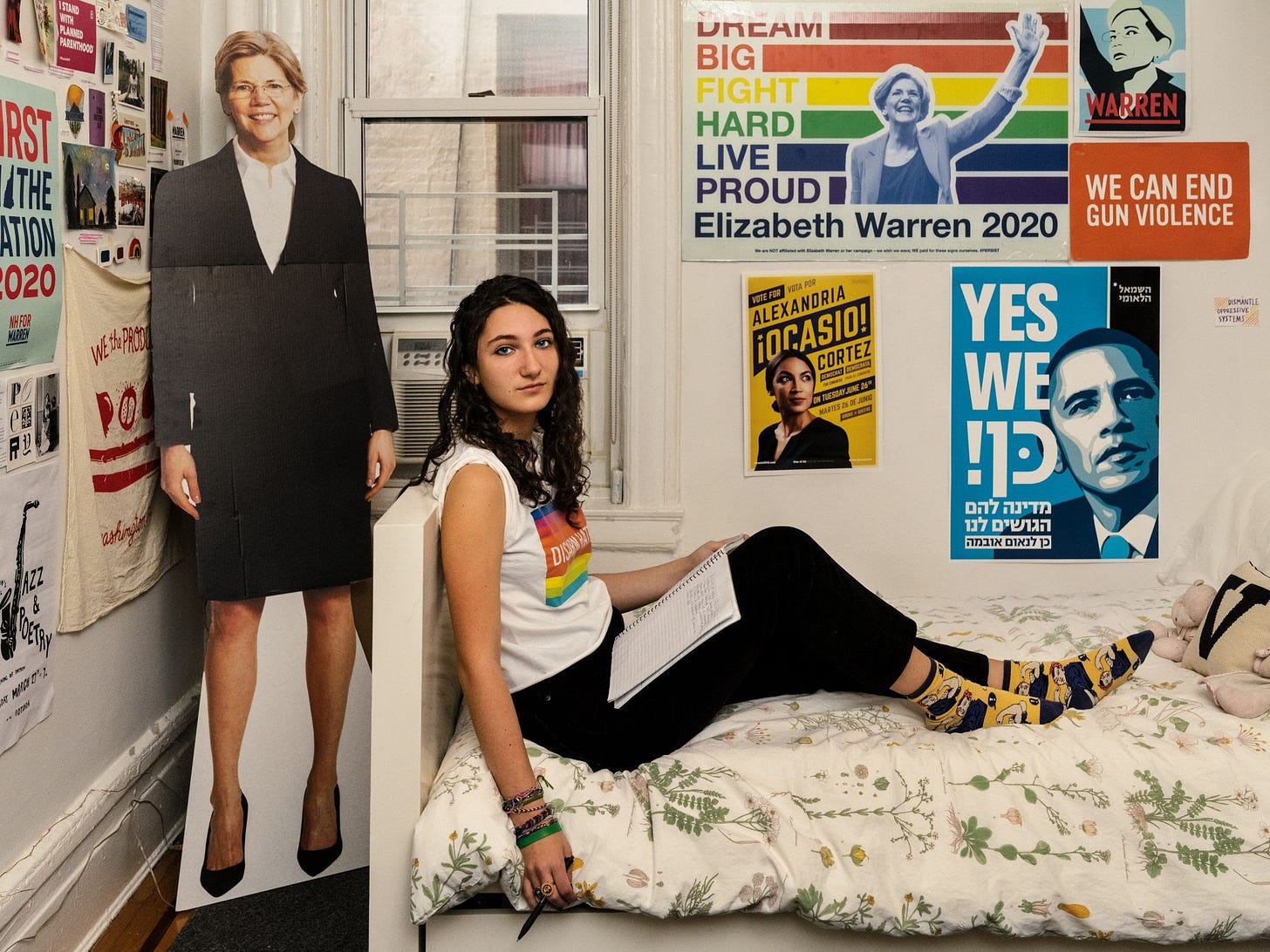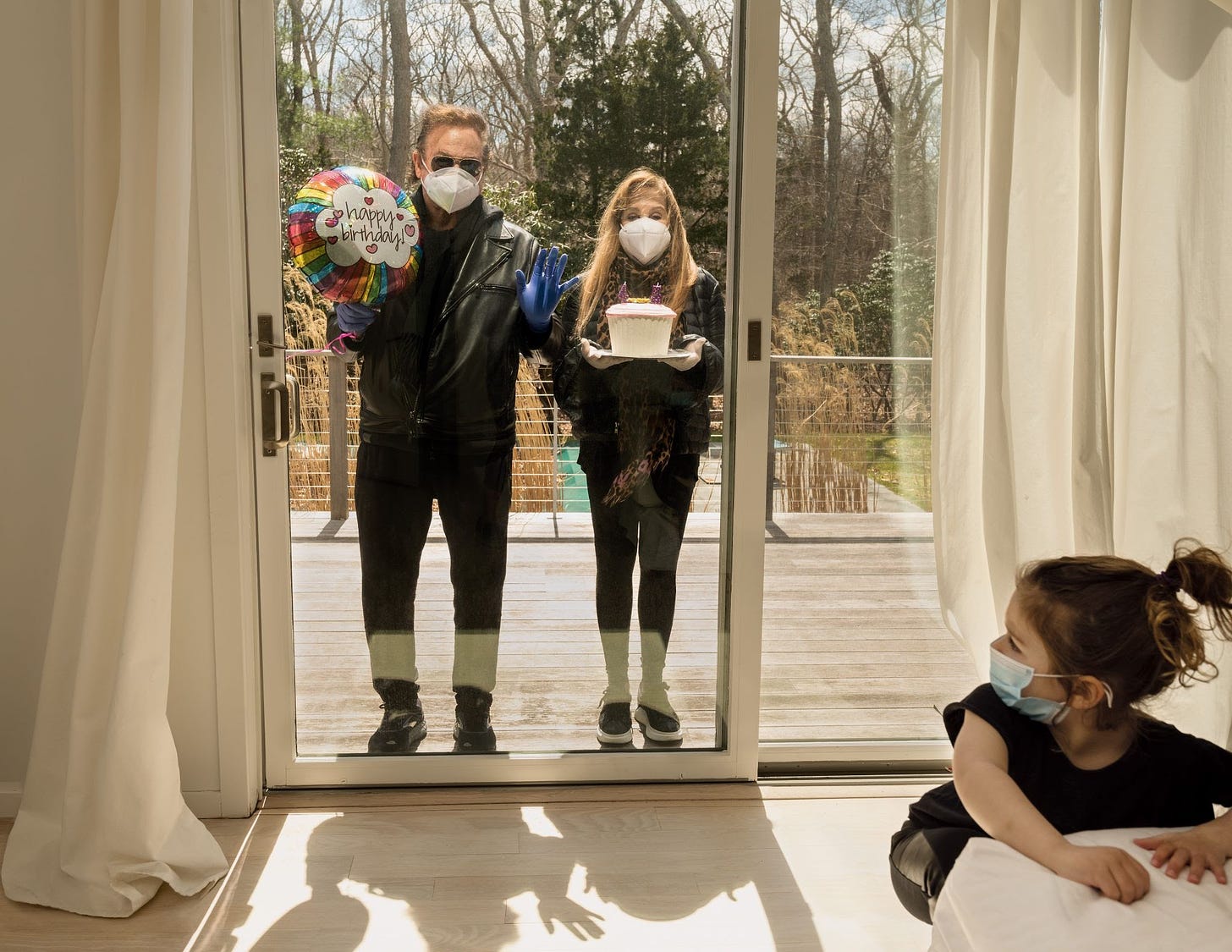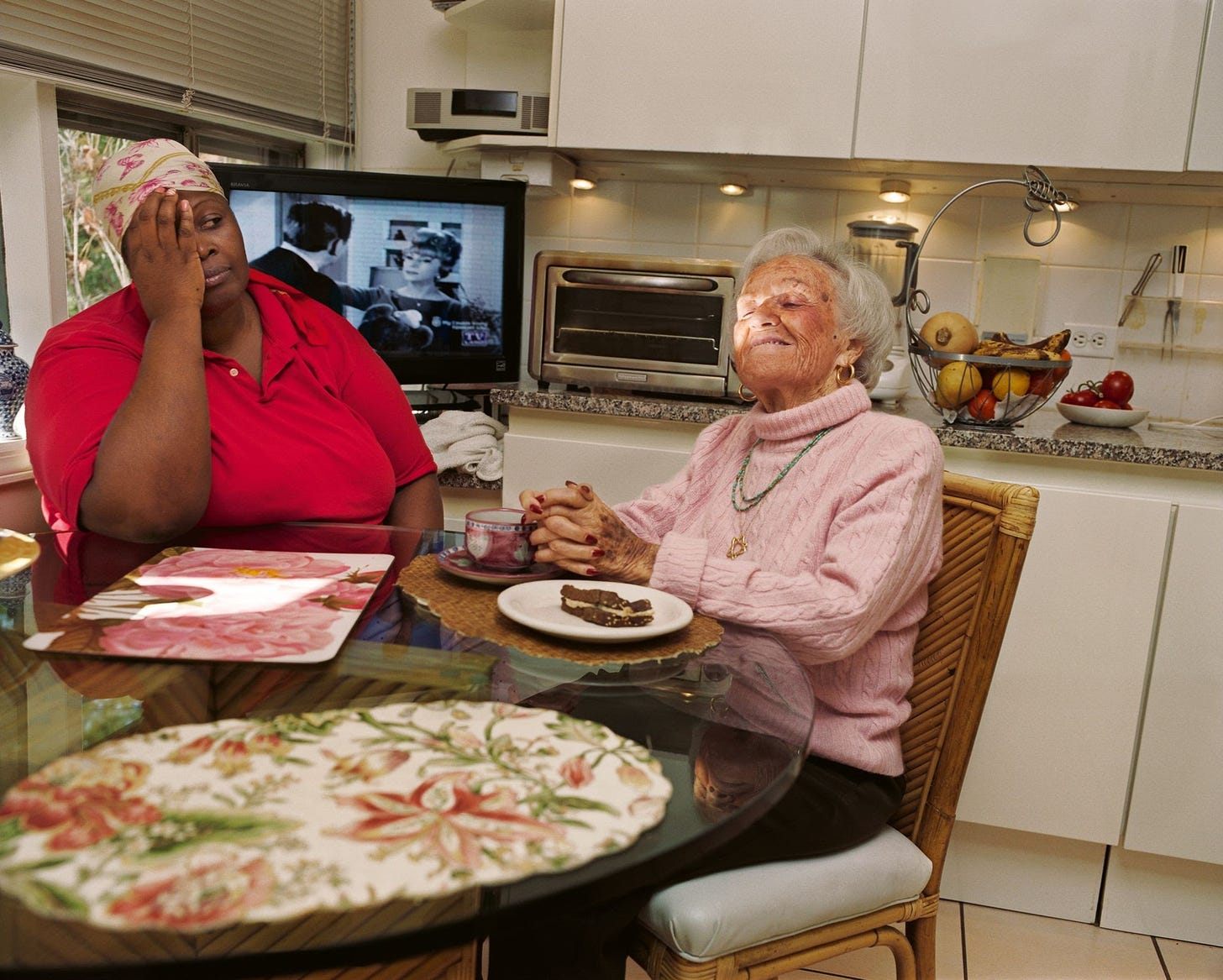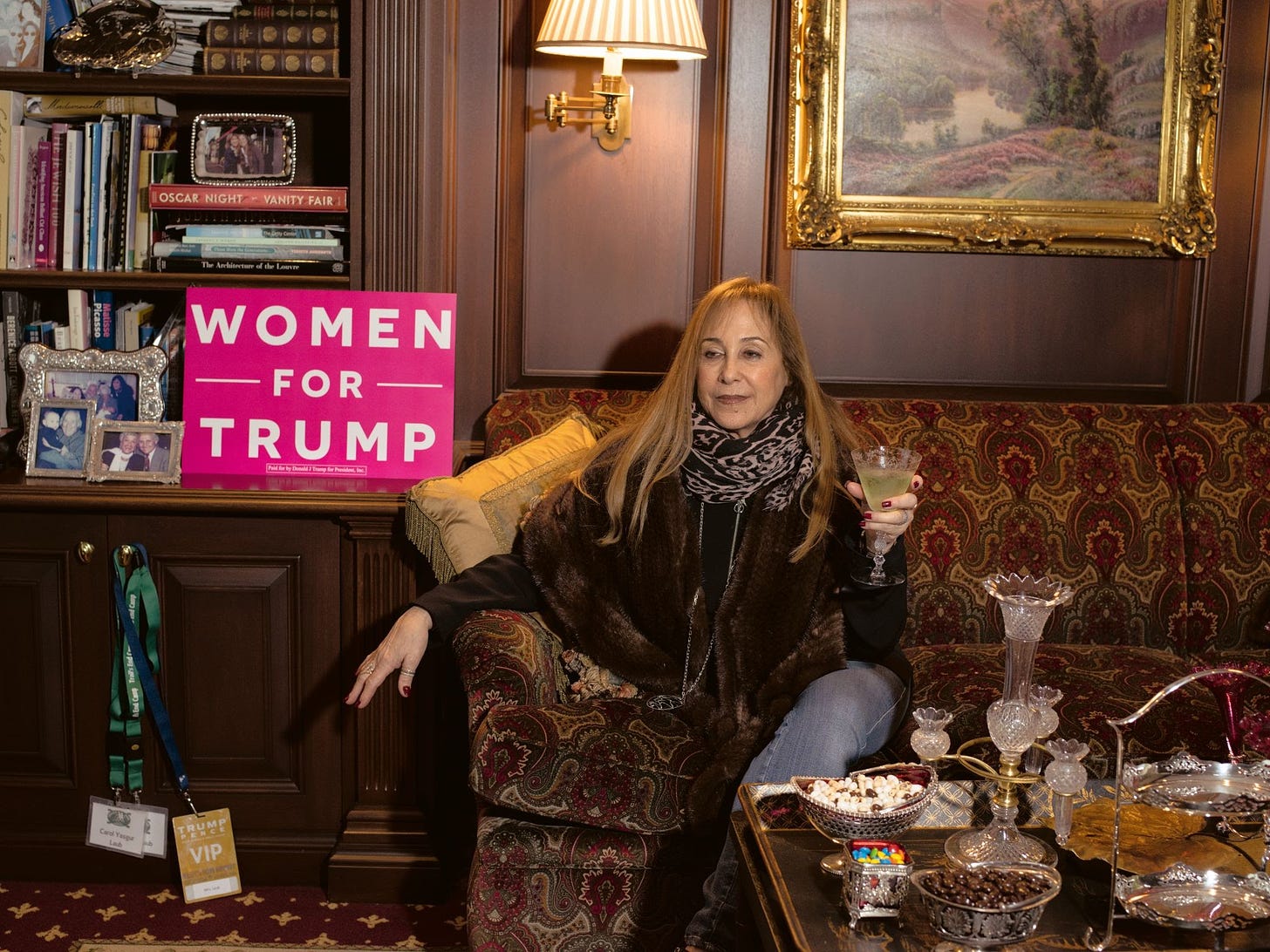Among the many unforgettable photographs in Gillian Laub’s new book, “Family Matters,” is Mom after yoga. In it, a middle-aged woman sporting all-white athleisure and a vambrace of gold bracelets is stretched out on a white carpet in savasana, or “corpse pose.” A few feet away, Fox News is on a huge flatscreen TV. It’s the height of the 2020 election, and President Donald Trump is barking about something in a hangar in Oshkosh, Wisconsin. The chyron reads: “Joe Biden Is a Puppet of the Radical Left.”
Here, in the comfort of her multi-million-dollar home in the suburbs of New York City, is the pro-Trump, white-privileged, hyper-cocooned Uber-Karen — she who was designed to outrage progressives like Gillian Laub, who just happens to be the daughter of Mom after yoga.
Laub marched for Black Lives Matter and partied in the streets when Biden won. “This man was gross,” she writes of Trump. “I tried to reach my mother, woman to woman, but it just never worked.”
Her parents’ support for Trump — and they were all in, donating big time, going to inaugural balls, posing with Omarosa — mystified Laub. She loved her mom and dad more than anyone in the world. They were so generous, so kind. And now, now . . . this? How could they?
After building a successful real-estate business, her parents moved, in the 1980s, to Chappaqua. There was lots of thinly veiled — and not so thinly veiled — antisemitism. Gillian’s first boyfriend, when she was 14 years old, told her to “tuck that shit in” when he spotted her wearing a Star of David. The local country clubs had a rule: no blacks or Jews allowed. In 1996, “when Trump’s club opened up, it was like, ‘If you can pay, you’re welcome!’ So my dad formed his own community there,” Laub said in an interview.
Laub’s mom would tell her that “the only reason I could afford to have the views I did was because of everything they gave me,” Laub writes, “because I had been shielded from the hard realities that, she asserted, were the ultimate challenge to progressive views.”
At the heart of this tug-of-war between mother and daughter were bigger questions: Who in 21st-century America counts as an “elite”? The seemingly out-of-touch parents who had to claw their way into the upper echelons of the socioeconomic food chain? Or their bleeding-heart liberal daughter who benefited from their striving? Does privilege come from money? Skin color? Admission to the institutions that control the country’s cultural capital?
These are some of the themes that course through Laub’s new book, published by Aperture, and the accompanying exhibition at the International Center for Photography. Laub, whose previous work explored segregated proms in rural Georgia (“Southern Rites”) and victims of the Israeli-Palestinian conflict (“Testimony”), achieves something here that so many Americans have failed to: to bridge the divide between warring, political camps; to make sense of how it is that people we love hold views we can’t stand; and to assert that it doesn’t matter more than family. Or it shouldn’t.
It is hard not to fall in love with the Laubs. They’re a type that pretty much everyone in this country who is not a descendant of the Mayflower is familiar with — those who hustled, made a boatload, and aren’t shy about their success. Perhaps in part because that success reaffirmed their love of America. One image — of Laub’s grandfather in super-tight Zebra swim trunks while hanging out in his vegetable garden — says it all. “I know I look nuts,” he seems to be saying, “but my wife buys me all my clothes, and she loves when I wear this crap, and who really cares anyway? I’m having the time of my life.”
“Family Matters” made me want to be a part of it all — for mom and dad to squeeze my face and insist I’m looking too svelte. For Gillian’s Aunt Phyllis to squeeze my upper arm and tell me she just heard of a new workout to get rid of that flab. For her brother-in-law, Scott, to say something off-color —“Can someone tell me why we can’t say ‘cross-dresser’ anymore?” — and for me and Gillian to roll our eyes at each other across the table. I want to waddle out of her family’s house after a long, loud Thanksgiving repast, very full, with a warm feeling inside and a slight headache from the endless yammering.
I sat down with Gillian to discuss all of the above. Here is our conversation, edited for length and clarity:
You set the stage with your grandparents, who look like they really enjoyed their life. They love their furs and their finery, and each other. When I look at the first pictures, I think: this is the heyday for Jews in America. They made it. And they made it here in a way that never was possible anywhere else. Did you always have a sense of patriotism from your family?
My grandparents had a profound sense of patriotism and civic duty. They were so proud. This country gave them the opportunity and they built their lives here. I have a letter in the exhibition from my paternal grandfather where he describes being beat up for being a Christ killer on his way to school in Red Hook, Brooklyn. He didn’t put it in the letter but he eventually learned to fight back and became a Golden Gloves champion. It hurts me so much that I didn’t appreciate him and what he went through when he was alive. Back then I would think, “Ugh, another one of grandpa’s lectures.” I didn’t get what he had to go through for us to live this privileged life. I didn’t get how I was raised, and how lucky I was until I saw more than the little tribe I grew up in. I feel so indebted to them, and I’m so sad that, by the time I could understand their history and what they went through to make it in America, they were gone.
There’s also a sense in the pictures that, not only do you have to be loyal to each other, but that you have to have fun together and love spending time together.
I do think that comes from the top. My grandparents had this sense of devotion to family above anything else, and to be good people. That's why, when the Trump years came, it was such an existential crisis for me, because, in my head, I was like, “Wait, wait, [my parents] are the best people I know! How can they be supporting this? I just don’t understand.” That’s why it was so traumatic for me! There were moments during his presidency that were really, really tough. There were four or five years where I woke up with a stomach ache, and I wasn't sleeping at night because of what was going on with them.
When you look back on the exhibition, do you regret any of the photos you took, or the screenshots you published of your family group text, getting into it over Trump?
I don’t have regrets. When my father and sister read the book, they weren’t angry, and they didn’t think I misrepresented them — they knew I was being honest — but they said that they felt so bad for me. They felt bad that I could get this upset and have this much angst and anger over someone. In their eyes, they thought I was being childish and judgmental. But these were my visceral responses.
There’s a lot of back and forth in the book between you and your dad, where you’re accusing each other of being “the elite.” Certainly if we are measuring in terms of wealth, your family is elite, but they don’t see themselves that way. Why not?
They really don’t. My father is really earnest, and he feels connected to blue-collar workers. He sees himself as a scrappy boy from Brooklyn that’s pulling himself up by his bootstraps. He’s not an intellect. He’s got street smarts. And he really felt as though he’d been condescended to for so many years by politicians, by “the elite,” and he resents that.
When he talks about the elite, he goes on rants about “people with fancy oratory skills who are full of shit and who have never worked a real job in their life.” His own father started a summer camp. His business is in the Bronx. So he prides himself on really connecting with all sorts of people. I would say, “How can you not think you’re elite? You live in Chappaqua, you drive fancy cars — you’re the elite!” And he would say, “No, it’s not about money, it’s about attitude. ‘Elite’ is an attitude.”
That’s like how Trump wasn’t really elite. The elite despised Trump.
Exactly! Where we live in Chappaqua, our neighbors were hugely anti-Semitic. We were not welcomed. We were like the gauche nouveau riche. My father wasn’t allowed into the clubs that my friend's parents belonged to. They did not allow black or Jewish people. When Trump’s club opened up, it was like, “If you can pay, you’re welcome!”, so my dad formed his own community there.
I don’t want to sound like I’m justifying it, because he overlooked way too much, but if we’re talking about empathy and meeting someone where they are, I understand it on an emotional level, because my dad is someone who does not follow the rules. He’s always felt like an outlier. Trump spoke to him in that way.
I’m in a politically mixed family, too. My mom is a liberal and my dad is a conservative. In 2016 and 2020, my mother threatened to withhold sex from my dad if he dared to pull the lever for Trump. He ended up writing in my mom’s name, but I know he wasn’t completely disappointed with the Trump presidency, and, for similar reasons that your parents talk about, he hated the Iran deal, and he loved when Trump moved the embassy to Jerusalem, even if he thought Trump was personally grotesque. But your parents weren’t Trump-curious, like mine. They weren’t shy about it. They were hard-core. They had the embroidered golf clubs and the swag, and they went to the inauguration parties and wrote checks. Had you ever seen them get that into anything before?
No! And I wish I was a psychoanalyst, so I could understand them better. I don’t think they’re conscious of what it was, but I think they felt like they belonged to something. They felt alienated in our country, which would blow my mind, because it’s like, “You felt alienated? You have the most amazing life! You won!”
I know my grandparents wouldn’t have voted for Trump. For my parents, though, I think about how, as Jews, they tried so hard to assimilate and be accepted into white America, so Trump instilled a fear in them that they were going to lose it all. With the picture of my mom doing savasana with Trump in the background, I walked into the room, and she said to me, “Gillian, just try and listen with an open mind.” And I couldn’t have timed this more perfectly, because Trump was giving a speech in an airport hangar talking to suburban women, saying something like, “Your American Dream will stay alive with me.” He was talking directly to my mother.
And she would say to me, “Easy for you to be so self-righteous, you’ve had it all. Do you want us to lose where we live?” She actually thought, in her heart of hearts, they would lose their home that we worked so hard to build. She was angry! It’s like, when you wake up and go to sleep with Fox News, the fear is so powerful.
You write about how you felt as though your mom were replaced by a Fox News anchor. What were they saying about you?
They think I’m just as brainwashed. They think the exact same thing about me.
So, toward the end of Trump’s presidency, you start to pull back from your family.
There was a lot of push and pull throughout the years. Eventually, Tahl, my husband, and I realized that we shouldn’t talk that much about this. There wasn’t that much time left of Trump’s presidency, and we were focused on just getting through the election.
I didn’t want to be apathetic, but I just decided to keep it light and talk about the kids. So I was sort of at the place of, “Okay family is more important.” Plus, I have a close friend in Miami in the same boat. Her father is really Trumpy, and she was my support group. One day she came to my house hysterically crying and said, “This isn’t worth it, my dad is in the hospital.” She had really cut her parents off, and she was so upset and ashamed of herself. She made me promise that I would go and be with them and love them.
It became, like, “Really, how can I give them this grief?” It made me check myself. This was right before Covid. It didn’t take much convincing. I knew I had hurt them, and our relationship was very strained. But then the pandemic hit, and the wound was opened up so much, and salt was poured onto it. It was so obvious to me that Trump was doing such a bad job of it, but they were determined to defend him. In the beginning, Trump wasn’t taking it seriously, so they were out at restaurants, and not taking it seriously, and we got into a huge fight, because I told them, “You cannot go out.” It was a massive fight, and I thought, “He’s killing my family.” I was so angry, because I thought, “Oh wait, this is actually becoming life or death.” I truly felt like they could die.
Did your parents start masking up?
Yes, thank god! Because that would have been a real problem. They started taking it really seriously. My mom will not take her mask off. And then the air started to come out of the balloon when Biden won, just because it meant Trump wouldn’t be part of our collective lives anymore. Then, with the insurrection, my dad started to come around. He was thinking, “This was enough. This is disgraceful.” And I thought, “Thank God, I have my family back.”
I’m assuming they don’t buy into the big lie that the election was stolen.
I wouldn’t go that far. My mom said she had something to do and wasn’t able to tune into Biden’s inauguration. My dad was actually open-minded and sent this hopeful text about Biden’s speech. Now, of course, he’s saying, “Well that feeling lasted about a week.”
Besides the Trump pictures, I love the ones of your grandmother aging — specifically, the one where she’s with her aide, Dorothy, in the kitchen, and your grandmother is basking in the sun while they’re eating lunch, and Dorothy looks kind of over it.
That’s something I thought about when I was growing up. It’s a really complicated relationship. Dorothy and my grandma used to fight over getting my grandma to eat, and I would apologize to Dorothy, like, “I’m sorry she’s so cranky.” I went to Dorothy’s apartment in the Bronx to interview her and see her life post-my grandparents. She told me what an impact my grandfather made on her life — he paid for her son to go to college, for example — and that he had begged her, on his deathbed, “Please, please take care of my BeaBea.” So, she really did feel that obligation to see that through. Her relationship with my grandparents, in general, was hysterical, but there was a big loss when my grandfather died. I forgot the point I was making . . .
It’s like there’s one read of the pictures that’s about power dynamics and racial dynamics. And then there’s another one about what it looks like to age with dignity, and about our obligation to show up for one another even when it’s a bit cumbersome because we made a promise or just because it’s the right thing. Growing up, I always found it weird when people called their nannies “like members of the family.” Because you don’t pay your family! It’s like saying, “We’re comfortable.” It’s a dead giveaway that you’re very rich. But there is a very fine line, because even though Dorothy is technically an employee, she’s also doing something so intimate, which is walking your grandmother to her death. And she’s there to fulfill a promise to your grandfather as much as, if not more so, than she is to collect a check.
If I were to say, more than anything, what identifies my family — it’s showing up. That is the one thing that they instilled in me, like, “You show up for the people that you care about. I don’t care if you don’t feel like it. I don’t care if you feel sick.” And there’s something really powerful and beautiful about that.
You’ve photographed Mariah Carey, Chrissy Teigen, Beyoncé, Dolly Parton. Who is the bigger diva? Your mother or Patti LuPone?
Wait, do you know the Patti LuPone story? It was 2009, and I went to photograph Patti LuPone for New York Magazine for the last showing of “Gypsy.” The stage manager and the publicist had me go around to get the shot of her last number, but they hadn’t told her I was going to be there taking a picture. She thought I was an audience member and stopped the show and screamed at me at the top of her lungs. I nearly died. I literally peed in my pants. I couldn’t tell, “Is she crazy?” And I thought, “Oh my God, I’m ruining my job — they’re never going to hire me again.” So they hustled me out of the theater, and she was really screaming. She called me that night to apologize and asked me not to tell the reporter what had happened, and I didn’t. It was the most terrifying moment of my life. She seemed like the biggest diva, but I shot her again, and we’ve laughed about it since.
So, my mom’s not a diva. She’s actually quite shy.




